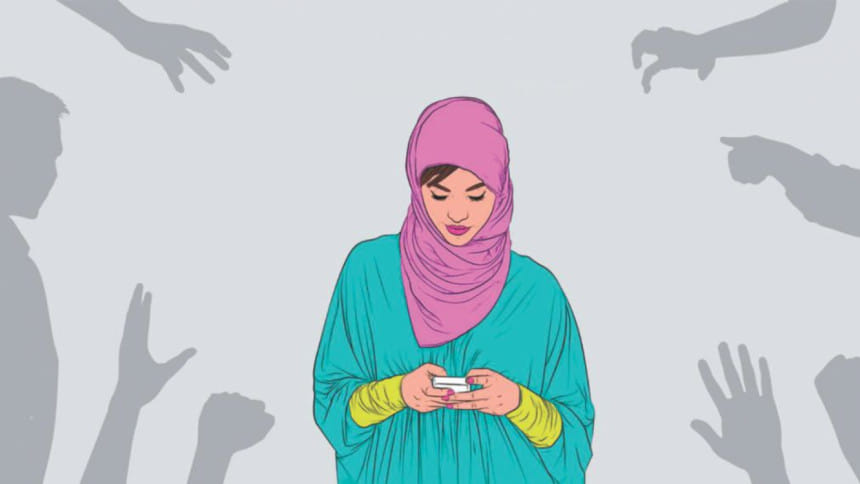Being Muslim – a pre-existing condition?

Recently, I have started reflecting on the implications of being a Muslim in a world that is predisposed to think that Islam is a religion of violence and hate. True, I don't wear my religion on my sleeve. But in the current Islamophobic environment in much of the western world, just being different means one is viewed with suspicion and hostility. I have thus become aware of my identity as a brown, Muslim woman as never before.
Growing up in Bangladesh and in a liberal family, "Muslimness" was never part of my conscious being. My first religious experience was that of listening to my grandmother recite the Quran every morning in her soft, sweet voice. This ritual was a source of tremendous comfort and touched a spiritual chord. Since my parents and teachers emphasised humaneness, religion for me was a spiritual guideline for striving to be a better human being.
But then things began to change. When I first moved to the US in the eighties, I heard stories of discrimination – how people of my colour, race or religion were denied apartment rentals or rejected in job interviews despite their high qualifications. I have been more or less spared these traumatic experiences except for occasional subtle forms of social discrimination. Perhaps I was in denial and did not allow these thoughts to override my positive experiences of which there were many. For example, I felt good when the African American cashier at the neighbourhood grocery store greeted me with "Salam, Ms. Ali". It reinforced my belief that in this country you could be different and still be a piece of the American mosaic.
The past year's developments have dealt a blow to my faith in America as a country of religious freedom and equal opportunity. The Trump campaign's anti-immigrant and anti-Muslim rhetoric has radically changed the national narrative. The right wing media is now conducting a full-scale anti-Islamic propaganda. Any journalist who has visited a Muslim country once or any ex-Intelligence agency employee is elevated to the level of an "expert" and feels free to project Islam as a religion of violence and hate. The general population has a hard time distinguishing between "Muslim terrorists" and mainstream Muslims. By extrapolation, most Muslims living in America are viewed as potential home-grown terrorists. This has resulted in hate crimes like the killing of an Indian in Olathe, Kansas by a white man who thought his victim was Iranian. The attacker obviously was ignorant about Islam, India or Iran. His motivating factor was hate – the hate propagated by the current administration that continues to label Muslims as "bad guys" who are against "American values".
Consequently, Muslims like me who follow the path of temperance and tolerance now find themselves between a rock and a hard place. We are the victims of Islamophobia on the one hand and encounter persecution and censure from extremist Muslims on the other.
The question is what can we say or do in the face of the prevailing bias and prejudice? Do we recoil into a shell? Should we dwell in fear and anxiety? Or should we channel our energy into positive actions to demonstrate that Muslims are as American as other citizens and they too have dreams and aspirations of a better life in a harmonious society.
Since much of the intolerance on both sides is the result of a lack of understanding between communities, the issue needs to be addressed through constructive debates and open dialogue. Recent interfaith efforts initiated by Jewish, Christian and Muslim communities are an indication that the current crisis may have unified people of different faiths – at least the lines of communication have been opened. This was also demonstrated by the fact that Americans of all races, religion and colour banded together to protest against the travel ban against Muslims imposed by President Trump.
I was hesitant about writing this column since religion is a sensitive and volatile topic. But I chose to express my thoughts since religious freedom is in peril in much of the world – and I don't mean only the Muslim world. Hence remaining silent would mean conceding to the bullies on both sides – the Islamophobes as well as the Islamic fundamentalists.
Let me end by quoting from a Charter of Privileges that the Prophet Muhammad (PBUH) issued to protect the monks of St Catherine Monastery in Mt Sinai (628 CE).
"This is a message from Muhammad ibn Abdullah, as a covenant to those who adopt Christianity, near and far, we are with them. Verily I, the servants, the helpers, and my followers defend them, because Christians are my citizens; and by Allah! I hold out against anything that displeases them. No compulsion is to be on them."
My parting question to those who criticise Islam as a religion of hate as well as the Islamic fundamentalists who propagate hatred and violence: What about Islam's core message of compassion and tolerance in the quagmire of our personal prejudices and bigotry?
The writer is a renowned Rabindra Sangeet exponent and a former employee of the World Bank.

 For all latest news, follow The Daily Star's Google News channel.
For all latest news, follow The Daily Star's Google News channel. 



Comments